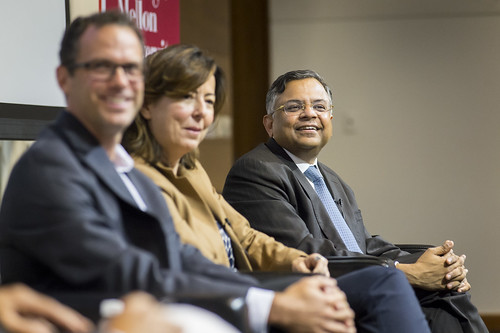New Era in Partnerships
Tata Consultancy Services (TCS), the fastest growing global IT and consulting company with offices in more than 46 countries and clients in every major industry, has donated $35 million to Carnegie Mellon University to fully fund a new facility and support students through CMU's Presidential Scholarships and Fellowships program.
The gift is the largest corporate donation in CMU history, the largest international gift to CMU and the largest gift to a university by TCS. Overall, it's the fifth largest gift to CMU.
The facility that will bear the TCS name will focus on education and research and provide collaborative space for faculty, students and TCS staff. It will be built along Pittsburgh's Forbes Avenue corridor — between Morewood Avenue and Craig Street — that also will feature the new Tepper Quadrangle and a new mixed-use facility across the hollow from the Robert Mehrabian Collaborative Innovation Center.
"With our shared commitment to education and research in areas that help address many challenges of our time, TCS' support of Carnegie Mellon is both natural and extraordinarily promising," said CMU President Subra Suresh. "Together, our two organizations have the capabilities to make breakthrough discoveries and the capacity to make societal impact on a global scale."
In an announcement prior to the Innovators Forum panel discussion on Tuesday, Aug. 25, President Suresh said the gift is a very powerful statement about philanthropy in support of higher education in a borderless world, where there's tremendous and relentless competition for top talent.
"Together, our two organizations have the capabilities to make breakthrough discoveries and the capacity to make societal impact on a global scale." — Subra Suresh
"Whether you're running a university or a global company, you want to find the best and the brightest people to do cutting-edge things. This is an expression of engagement by a major global company engaging with a university," Suresh said. President Suresh said TCS is a household name in India and many other countries, and soon college students in the U.S. will be familiar with the TCS name.
Natarajan Chandrasekaran, CEO and managing director of TCS, said partnerships are critical in today's world of rapid technological advances. He said that the collaboration between CMU researchers and TCS would bring great opportunities to tackle many industry problems.
"CMU is known for the best in education and research in machine learning, robotics, driverless cars, statistics, information management and other disciplines, and how these technologies can impact businesses," he said.
Governor Tom Wolf, who attended the event with several local government officials, including Congressman Mike Doyle, Allegheny County Executive Rich Fitzgerald and Pittsburgh Mayor Bill Peduto, said the partnership reflects well on CMU, one of the premier universities in the world; on TCS, one of the most distinguished companies in the world; and on Pittsburgh and Pennsylvania.
Wolf called CMU a "magnet" and a "catalyst" for leading businesses and organizations "that want to feast at CMU's academic table." He predicted that the partnership would foster ideas, products and services that will transform the world.
Following the event, Dietrich College Dean Richard Scheines moderated the panel discussion on "Industry-Academic Partnerships: A New Global Era."
Scheines led CMU professors and entrepreneurs Jay Whitacre, founder of Aquion Energy, and Jelena Kovačević, and TCS' Chandrasekaran in a discussion about partnerships. Topics included what role government should play, intellectual property, culture and engaging students.
Kovačević, who is working with UPMC Children's Hospital to develop mathematical models and software that can be used to diagnose middle ear infections, said industry-academic partnerships provide a mutually beneficial experience.
"Partnerships provide an opportunity for companies to get access to top talent and for faculty to get funding for research. It's a symbiotic relationship," she said.
Related:
- Find out more about the gift.
- Watch the ceremony and panel discussion.
- Watch highlights from the event.
- Bloomberg: Tata Consultancy To Form Tech Center in Gift to Carnegie Mellon
- Post-Gazette: CMU receives $35 million from India-based corporation to develop innovation facility

Governor Wolf speaking at a @CarnegieMellon panel on tech innovation and the partnership between CMU and @TCS_NA. pic.twitter.com/JKViqtSk1b
— Governor Tom Wolf (@GovernorTomWolf) August 25, 2015
Thrilled to join @CarnegieMellon USRepMikeDoyle @GovernorTomWolf & @billpeduto for announcement of CMU partnership w/Tata Consultancy Svcs
— Allegheny Co. Exec. (@ACE_Fitzgerald) August 25, 2015